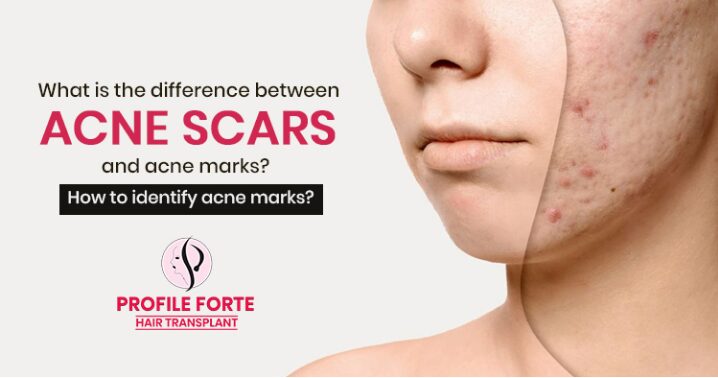Have you ever wondered about the distinction between acne marks and acne scars?
While these terms are often used interchangeably, their differences are crucial. Acne marks refer to temporary discoloration left after a pimple heals, while acne scars are permanent skin texture changes caused by collagen damage.
Knowing how to differentiate between the two can guide you in choosing the proper treatment. Dive into the world of skincare as we unravel the mysteries of acne marks vs acne scars, helping you navigate your journey towards clearer, healthier skin.
Nature
In the realm of dermatology and medical aesthetics like acne marks and acne scars, it’s essential to understand the difference between them. Acne marks are just dark spots left behind after pimples go away.
They mainly affect the top layer of the skin. On the other hand, acne scars happen when there’s damage to the deeper layers of the skin. This can cause changes in the texture of the skin, like holes or raised areas.
Dealing with these skin problems involves knowing how they work in our skin’s natural healing processes. While marks often fade with time and good skin care, scars may need more serious treatments because they affect the skin’s structure underneath.
Knowing the basics of these skin conditions helps you choose the right ways to treat the surface marks and the deeper scars caused by acne.
Healing Process
Understanding the difference between acne marks and acne scars is crucial for getting clear skin. Acne marks are like temporary discolored spots left after a pimple goes away. They can fade with good skincare.
Acne scars are changes in skin texture that stay longer because of collagen damage during healing. To fix acne scars, special treatments like laser therapy or microneedling may be needed to help the skin heal better.
By taking care of your skin gently, using sun protection, and trying targeted treatments, you can speed up the healing process for acne marks and scars. This approach can give you smoother and more even skin.
Severity
When discussing how bad acne marks are compared to acne scars, it’s essential to see how each one affects the skin differently. Acne marks, like dark spots, mostly change the skin’s color after pimples go away and can get better with time.
Acne scars are more serious as they come from damage deep in the skin when acne heals. These scars can make the skin bumpy or uneven forever. Using special creams can help with bad acne marks and scars.
These creams can lighten dark spots, help the skin heal, and make the skin feel smoother. Knowing how serious acne marks and scars are can guide us in picking the right cream to make our skin look better.
Persistence
Sunlight plays a big part in why acne marks and scars stick around. Acne marks are like temporary spots left after a pimple goes away. They can fade with time and good skin care, especially if you shield your skin from the sun.
In contrast, acne scars go deeper into the skin layers and can be harder to get rid of without help from a dermatologist. Sun exposure can worsen marks and scars by changing skin color and slowing down healing.
So, it’s crucial to consistently protect your skin from the sun to lessen how long these reminders of acne stay visible. Knowing how sunlight affects acne marks and scars can help you take steps to safeguard your skin and speed up the healing process, reducing how long these blemishes linger.
Treatment Options
To help with skin marks and scars from acne, it’s good to know the differences and how to treat them. Skin marks are like temporary spots that can go away on their own, while scars stick around due to skin damage.
You can try special creams like retinoids or vitamin C or treatments like peels, gentle abrasion, or laser therapy for marks. For scars, you might need procedures like tiny needle pricks, filler injections, laser work, or peels to make the skin look better. It’s smart to chat with a skin pro to find what works best for you.
Causes
Acne marks and scars happen for different reasons. Marks come from the skin, making more color when acne is red or brown. Scars form when skin gets messed up, healing from bad acne and leaving dents or bumps.
Causes of scars mostly come from how the body reacts to fixing skin after acne. Genes, skin type, and how bad the acne is affect whether you get scars. Taking good care of your skin and using the right treatments can help avoid lasting damage.
Appearance
When talking about how acne marks and acne scars look different, one big thing to notice is how long they stick around. Acne marks, also called post-inflammatory hyperpigmentation, are flat spots that can be pink, red, or brown.
They show up because of swelling and usually fade over time, anywhere from a few weeks to several months. On the other hand, acne scars are dents or raised bumps on the skin that happen when the skin’s collagen gets damaged while healing.
These scars can look like small holes or bumps on the skin. Unlike marks, scars don’t go away on their own, but treatments like laser therapy or microneedling can help make them less noticeable.
Prevention
To stop acne marks from becoming hard scars, do these things early. Wash your face gently, scrub often, and use lotion to help marks fade before they become scars. Shield your skin from the sun to keep marks from getting darker.
Don’t pick or pop pimples to lower scar chances. If acne is bad, see a pro quickly. They can give treatments like peels, needling, or lasers to prevent deep scars.
Understanding Acne Marks vs Acne Scars
Knowing the difference between acne marks and scars is crucial for caring for your skin. Acne marks are like temporary color changes that usually go away on their own.
On the other hand, acne scars are more serious because they can leave permanent texture changes on your skin. By learning how to tell them apart and what treatments work best for each, you can improve your skin health.
Remember, with the right knowledge about acne marks vs acne scars, you can make smart choices for happier, healthier skin.
Did you find this article helpful? You can check out our website for more awesome content like this.




